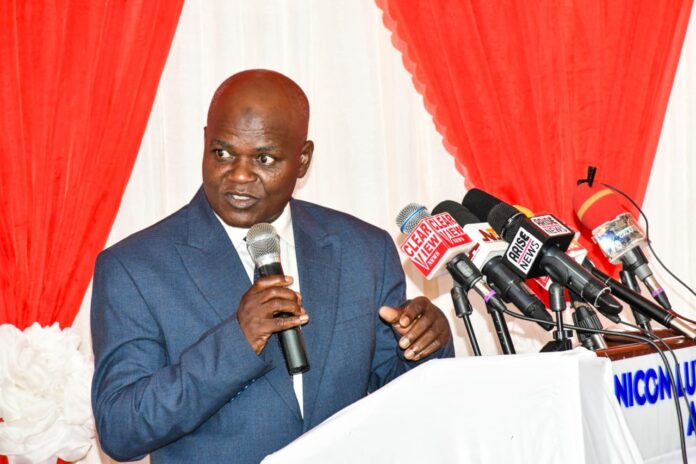An Audacious Peep into Nigeria’s Cashless Future
By Nduka Chiejina
TECHDIGEST – I was pleasantly surprised when I was contacted to be the Reviewer of a book by Mr Abdulrahman Abdulraheem of the Economic Confidential.
It was a pleasant surprise because it remains a special privilege going through the work and sharing the stage with these eminent personalities while we go through the thematic preoccupation of the Book, “eNaira Revolution: A Peep into Nigeria’s Cashless Future.”
The Book uses the past to trace the present and tells the future in a way that Nigerians who suffered the last cash crunch in the country may not find palatable. But since the Book is on eNaira, the Central Bank of Nigeria (CBN’s) official digital currency, which is supposed to be the best, cheapest and most convenient means of business transactions, provides solutions to the limited availability of cash which the Book predicted are also therein.
And what are these solutions? Download the eNaira wallet on your smartphone if you have or make use of the USSD code which is useful for those without smartphones and begin to enjoy fast, cheap and seamless transactions with no bank charges or network headaches. This is because on the part of the apex bank, spending hundreds of billions of naira to print excess and needless cash that will end up causing inflation and encouraging crimes like money laundering kidnapping and armed robbery is not sustainable. The reality is the cashless future for everyone. A future that helps the monetary authorities to keep the economy sane and also works for the masses.
Due to the fact that the eNaira is a multi-purpose instrument which is capable of tackling a lot of issues and solving plenty problems, this Book is divided into four chapters – Cashless Future, Financial Inclusion, Antidote to Cash Crunch and Human Capital Development.
Chapter One started with a robust survey of how the series of cashless policies rolled out by the CBN and other federal government agencies like the Nigeria Financial Intelligence Unit (NFIU) between 2022 and early 2023 have been encouraging Nigerians to embrace the eNaira as the best alternative for transactions. While the CBN came up with cash withdrawal limit and naira redesign policies, the NFIU announced the ban on cash withdrawal of government funds and directed that all withdrawals and transfers from government accounts must be through the banking system for the purpose of monitoring. Experts that the author spoke to were unanimous in their conclusion that these policies exposed the body language of the federal government which is in favour of a cashless future which some Nigerians started preparing for by embracing the eNaira.
One piece that strikes me in this chapter is the one in which the author analysed the strategy for the eNaira advocacy and the decision to use one of the country’s famous celebrities, Gabriel Afolayan, as a brand ambassador. Readers who are interested in the global history and evolution of celebrity branding will find the piece interesting as the author takes time to travel down memory lane to explain the philosophy behind using popular faces to advertise a product or promote a cause.
In Chapter Two, the author dwells on financial inclusion which is one of the key objectives of the digital currency revolution in the first place. Readers get to see efforts by the CBN and several of its partner agents to take the good news of eNaira to the grassroots across the country where disadvantaged people dwell. The author also tells the story of his encounter with the Permanent Secretary in the Ministry of Humanitarian Affairs, Disaster Management and Social Development, Dr Sani Gwarzo, who told him of how his Ministry was collaborating with the CBN to onboard millions of beneficiaries of cash transfers and other poor Nigerians and paying them via their e-wallets. In this Chapter, the author informs his readers about the huge capacity of eNaira to also help the federal government in its poverty alleviation plans.
In Chapter Three, the author risks incurring the anger of Nigerians by seemingly suggesting that they were to blame for the unprecedented torture they suffered during the cash crunch. By saying if majority of Nigerians had embraced the eNaira long before the naira redesign policy of the apex bank, they wouldn’t have suffered untold loss of life, dislocation and hunger, the writer may sound insensitive to some readers. But he doesn’t stop there, he goes ahead admit that the epileptic network of the commercial banks which made transfers impossible during the crunch made life difficult for Nigerians.
Also, in this chapter, the author displays his creative genius in the piece titled: “Nigeria’s Cash Crunch and eNaira’s Emi Lokan Moment.’ He explains in detail the countless benefits of the eNaira and how it was the solution to the cash crunch and any other challenge that may come up in the future.
In Chapter Four, the Book talks about the life-changing opportunities embedded in the eNaira platform for the average Nigerian in terms of jobs, poverty alleviation, wealth creation, health insurance etc. It also talks about the amazing capacity of the digital currency to support revenue generation at the macro level in terms of boosting taxation and easing diaspora remittances.
Generally, the author has made bold calls about the country’s cashless future. But according to the author’s crystal ball, this eNaira-influenced cashless future would not be imposed or come in form of fiat or compulsion, Nigerians would just learn to accept it, grow in it as they continue to benefit from the viability and versatility of the eNaira platform and the economy would be better for it.
The book reminds readers that the eNaira is the solution to the challenge of theft, commercial kidnapping, money laundering, fire incidents etc that come with keeping cash while it is also the solution to the unreliable network people experience in internet banking.
This Book is highly recommended. It is a must-read for those students, scholars, journalists, activists and even government officials who are interested in the pursuit of a healthy economy for Nigeria.
Nduka Chiejina
Chairman Finance Corresoondent Associstion of Nigeria (FICAN)
Abuja
















